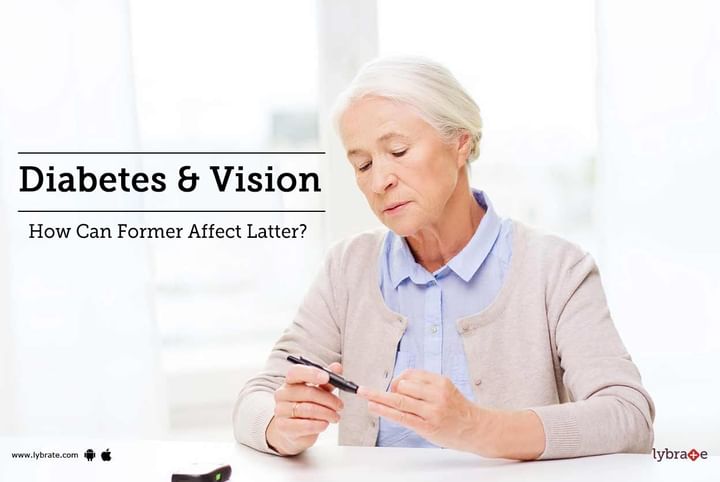Diabetes & Vision - How Can Former Affect Latter?
Diabetes is a scourge that has been spreading like wildfire across the globe. It is one of the major public health concerns of the modern era. Diabetes not only causes damage to your internal organs but will also take a toll on your eyes if left unchecked. Retinopathy, glaucoma, cataracts and blurry vision are common phenomena accompanying diabetes.
You may not notice it at first. Symptoms can include:
-
Blurry or double vision
-
Rings, flashing lights, or blank spots
-
Dark or floating spots
-
Pain or pressure in one or both of your eyes
-
Trouble seeing things out of the corners of your eyes
Thus Comprehensive Dilated Eye Exam plays an important role to detect it.
Here are some common Diabetic Eye Problems:
-
Blurry Vision: Do things turn blurry for you at times? Well, it is not your glasses which are at fault but your high blood sugar count swelling up the lens within your eye and changing your ability to see. In order to correct your vision, you need to try bringing your sugar level back to the optimal range, which is 70 to 130 milligrams per deciliter. Do call on a doctor if the situation persists or deteriorates further.
-
Cataracts: Your eye lens is just like a camera that enables you to see through it by focusing on a particular object. If you have a cataract, your otherwise clear lens gets shrouded a layer making it opaque and cloudy. You tend to face difficulties in the form of glares, blurred or clouded vision, and blind spots among other problems. Diabetics are prone to acquiring cataract much earlier than others, with the condition worsening subsequently. They are removed via surgery where your doctor substitutes your hazy lens with a new artificial one.
-
Glaucoma: You eye transmits images to your brain through the optic nerve. Pressure may build up within the optic nerve resulting in damage and ultimately causing total or partial blindness. This is a fairly common disorder with diabetics and a large number of cases pertaining to blindness due to diabetes are caused by this. Usually, glaucoma can be treated with laser, surgery, eye drops or medicines. It is important to visit a doctor as it can help stop the progression of the disorder much earlier.
-
Diabetic Retinopathy: The retina is a cluster of cells behind your eyes that absorbs light and converts them into images that are sent to the brain via your optic nerve. High blood sugar count can actually wreak havoc on the tiny blood vessels within your retina giving rise to diabetic retinopathy. Symptoms may include blurry vision, seeing spots, blind spots and difficulty in low light or night time. Retinopathy can cause you to progressively go blind and thus it is imperative that you go for periodic check-ups and keep your diabetes under control.
Control and Prevention
If you have diabetes, you are not doomed to develop diabetic eye disease. Although you are at risk, you have the ability to control your diabetes so your vision is not compromised. Controlling diabetes requires you to monitor your blood sugar levels regularly. Follow some steps to help you control and preserve your vision:
-
Taking your Medicines regularly as prescribed by your doctor. Skipping of medication may lead to irregular control and is more hazardous.
-
Eating Right food is essential when trying to prevent or control diabetes. Eat a diet that is high in nutrients, low in fat and moderate in calories. A high-fiber diet with low glycaemic index foods (slow-release carbohydrates) will keep blood sugar steady and make you feel full. Although you do not need to eliminate sugar completely, you must limit sugar to a small serving. The good news is that as you cut sweets, your cravings will change and you will naturally desire more healthy foods.
-
Keep your A1C level under 7%: A1C is a test you have during a visit to your endocrinologist to determine how well-controlled your diabetes has been during the previous 2-3 months. Keeping your blood glucose in this target range means less damage to the delicate blood vessels around your eyes.
-
Control blood pressure and Cholesterol Levels: People with diabetes have a greater chance of having high blood pressure and Cholesterol, which can cause eye blood vessel damage.
-
Regular Physical Exercise can help you control your blood sugar, increase fitness and reduce your risk for heart disease and nerve damage. You must track your blood sugar before, during and after exercise to prevent hypoglycaemia.
-
Annual comprehensive eye exams: If you are pre-diabetic or diabetic, it is even more important to have Complete Dilated eye exam to initially get baseline recordings of the eye conditions and then regular yearly follow-up visits to monitor changes in your vision. If you notice blurred vision and you have had diabetes for a length of time, it might be a signal you need to keep tighter control of your glucose levels.



+1.svg)
